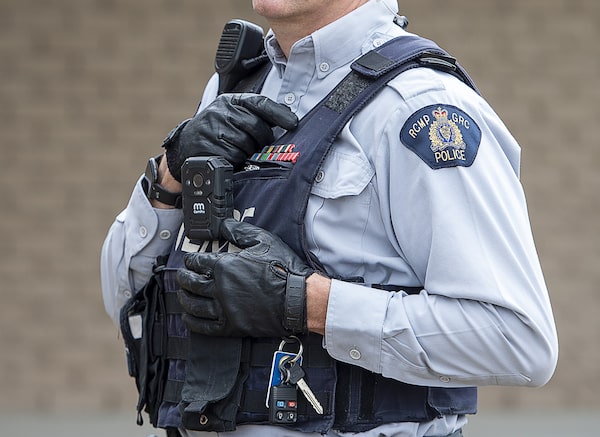
An RCMP officer wears a body camera at the detachment in Bible Hill, N.S., on April 18, 2021. Alberta's plan to make all police services in the province use body cameras is getting a field test this spring.Andrew Vaughan/The Canadian Press
The Mounties are preparing to begin using hundreds of body-worn cameras, in what they are referring to as a field test. The move brings the force closer to a long-promised Canada-wide rollout of the devices, which are already used by other police forces in many Canadian cities.
After several years of delays in settling upon a camera vendor, the RCMP’s trial run of the technology is scheduled to start this spring. This tryout will almost certainly draw the attention of privacy officials, police-union bosses, and provincial and municipal civil servants, all of whom have been waiting to see how the country’s largest police force will introduce the cameras to more than 10,000 RCMP officers.
In 2020, shortly after the killing of George Floyd by police in Minneapolis sparked continentwide protests, Prime Minister Justin Trudeau pushed the Mounties to adopt the cameras, which can be used to buttress or refute officers’ accounts of on-the-job incidents, up to and including fatalities. The federal government later announced $240-million in funding to kickstart the RCMP program. Prior to that, coroners’ inquests into cases where civilians were shot by police had called upon the Mounties to adopt body-worn cameras.
The RCMP began pilot projects with body-worn cameras in 2010, but the force’s leadership often balked at the technology’s costs. In a 2015 report, Canadian privacy officials urged law enforcement agencies to think through the acquisition of the cameras, saying the technology “poses serious implications for individuals’ right to privacy.”
In January, the federal government chose Motorola Solutions Canada as the RCMP’s camera vendor. This spring’s field tests are scheduled to take place in Mountie detachments in Nova Scotia, Nunavut and Alberta. “These locations were chosen to reflect the urban, rural and northern/remote settings where the RCMP provides policing services,” RCMP spokesperson Robin Percival said in an e-mail on Wednesday.
She said the field tests will involve about 300 officers. If the technology is deemed successful, that would pave the way for the RCMP to roll out cameras to thousands of officers starting as early as later this year.
The RCMP is making its body-worn camera policy available to the public upon request. It is less detailed than similar policies from some municipal police forces.
Police body cameras are touted as an accountability tool. But getting the footage is a challenge
For example, the Toronto Police Service has posted a policy that explicitly cautions police officers against adjusting their body-worn cameras once deployed during an event. It says “the recording shall not be stopped, muted or deliberately repositioned.” Toronto officers, who began using the technology three years ago, are also told they will be docked at least a day’s pay if they do not comply with the force’s camera procedures.
The RCMP’s policy document is relatively silent on fines. It does say that a Mountie should “not stop recording or deliberately reposition” their camera.
Most of Canada’s provinces and territories hire federally managed Mounties as local law-enforcement officers. The provinces involved in the field tests have said they will entrust scrutiny of the RCMP’s body-worn camera program to Ottawa for now, though Alberta announced Tuesday that it would be coming up with its own standards for the devices.
Communities that rely on Mounties fear the $240-million in announced federal funding will cover only the start of a much larger bill. The Union of B.C. Municipalities has warned its members that body-worn cameras can cost up to $3,000 per officer per year, not including the costs of storage, software, data access and the need to hire new staff members. The Federation of Canadian Municipalities last year called upon the federal government to absorb all the costs associated with RCMP body-worn cameras.
In 2021, the National Police Federation, the union that represents nearly 20,000 Mounties, called upon police brass to implement the technology with consideration for officer privacy. The RCMP policy document says the NPF is to be looped in on any requests from code-of-conduct investigators for footage from officers’ body-worn cameras. Senior officers will be required to complete risk assessments and notify affected officers before publicly releasing any videos of “high public interest.”